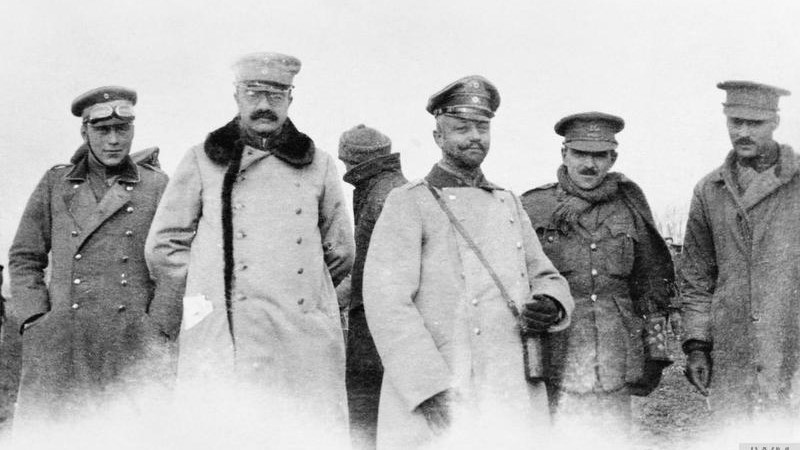A ceasefire to the fighting between Israel and Hezbollah in Lebanon went into effect last month. The deal involves Israeli forces withdrawing from Lebanon over a sixty-day period, with the Lebanese army taking control of territory in the south of the country to ensure Hezbollah does not rebuild forces.
While this ceasefire is tenable, at least one hopes, a permanent truce remains to be seen. It, nonetheless, makes one wonder how and why human beings mistreat other human beings even to the point of torturing and killing them? We see this with the war in Sudan between the Sudanese Armed Forces and the rebel paramilitary Rapid Support Forces, which has sparked ‘a crisis of epic proportions’. Why can warring factions, like the Russians and Ukrainians not embrace each other as children of God and stop fighting each other?
As nihilistic war may be, one hundred years ago on Christmas Eve, during the First World War, two warring factions came together and literally embraced each other as brothers in Christ.
The Christmas Truce
In July 1914 the world was at war as the Allied Powers of France, the United Kingdom, and the Empire of Russia—America entered the Great War in 1917—fought the Central Powers of Germany, Austria-Hungary, and Bulgaria. Yet, five months into the fighting in the trenches in the Ypres Salient, northwestern Belgium near the French border, there was a most unexpected moment of joy and hope, which has historically been called the Truce of Christmas.
At about 10 p.m., British machine gunner Bruce Bairnsfather, who went unto become a prominent cartoonist, recounts that he heard a noise. ‘I listened’, he recalled. ‘Away across the field, among the dark shadows beyond, I could hear the murmur of voices’. He turned to a fellow soldier in his trench and asked: ‘Do you hear the Boches [Germans] kicking up that racket over there’?
‘Yes’, he replied. ‘They’ve been at it some time!’ They eventually heard the Germans singing Stille Nacht, heilige Nacht (Silent Night, Holy Night). The complete lack of any of the usual sounds of war that night made the entire experience feel like a dream.
At daybreak when the British looked across ‘No Man’s Land’ saw signs erected by the Germans in broken English that mostly read: ‘You no fight, we no fight.’ Some British improvised signs that read: ‘Merry Christmas.’ The Germans responded with a sign reading: ‘Happy Christmas’, over their trenches.
Momentarily forgetting their hatred towards each other, enemy soldiers began to climb nervously out of their trenches, and to meet in the barbed-wire-filled ‘No Man’s Land’ that separated them. Normally, the British and Germans communicated across ‘No Man’s Land’ with streaking bullets, with only occasional gentlemanly allowances to collect the dead unmolested. But now, there were handshakes and words of kindness. The soldiers traded songs, tobacco and wine, joining in a spontaneous holiday party in the cold Christmas day. Even spontaneous games of soccer were reported to have taken place.
Not Everyone Was Content
On 7 December 1914, Pope Benedict XV implored the leaders of the battling nations to hold a Christmas truce, asking ‘that the guns may fall silent at least upon the night the angels sang’ in order to honor the King of Peace. The plea was officially ignored.
As reports of this event took place, many were angered. British General Sir Horace Smith-Dorrien, after he heard of the Christmas Truce on 27 December, he wrote in a confidential memorandum that ‘this is only illustrative of the apathetic state we are gradually sinking into’. Some accounts hold that soldiers were punished for fraternization, and top command issued orders that it should never happen again. On the German side, a twenty-five-year-old soldier scolded his fellow soldiers during the Christmas Truce saying: ‘Such a thing should not happen in wartime. Have you no German sense of honor left?’ His name was Adolf Hitler.
Where Are the Men of Good Will?
The Christmas Truce was certainly unexpected. Nevertheless, it highlighted how Christmas, the birth of Christ itself can bring peace amongst warring parties, whether it is on the battlefield, in the political arena, or even within our own hearts. Hence, the words of the angel of the Lord spoken to the shepherds:
‘I bring you good news that will cause great joy for all the people. Today in the town of David a Savior has been born to you, who is Christ, the Lord.This will be a sign to you: You will find a baby wrapped in cloths and lying in a manger.’ Suddenly a great company of the heavenly host appeared with the angel, praising God and saying: ‘Glory to God in the highest heaven, and on earth peace amongst men of good will.’ (Luke 2, 10-14)
And this is exactly what is missing today, ‘men of good will’. Yet how can there be ‘men of good will’ when instead of saying ‘Merry Christmas’, we say ‘Happy Holidays’ for fear of offending those who do not believe that Jesus is the Messiah? Christmas has also not only been mythologized, it has been altogether commercialized, thus degrading this sacred day to a mere exchange of gifts.
I recall growing up as a child in the 1970s and 1980s how much we as kids looked forward to the classic cartoons and claymations, like The Little Drummer Boy, The Little Christmas Burro, and of course, A Charlie Brown Christmas, and yes, going to mass to celebrate the birth of our Savior. Today, the apple has certainly fallen far from the tree.
In 1914, a simple chanting of a Christmas carol brought bitter enemies together, as if they had always been united. In a sense, they were united through Christ, Who made them see each that they could live in harmony. Could that happen today?








